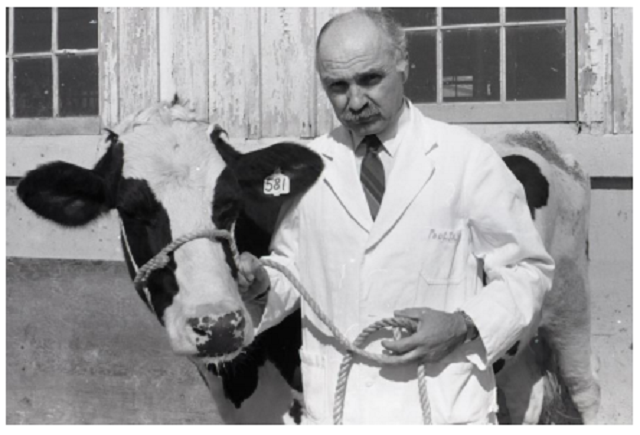Remembering Professor Frank Hurnik

Remembering Professor Frank Hurnik
When I learned of the passing of Dr. Frank Hurnik on June 10, 2018, I remembered a very kind man. I also thought about how one person's life can set the pathway for the lives of many others for generations to come, and I felt deeply grateful for Frank’s life. As one of the first applied ethologists in all of Canada and a founder of the Campbell Centre for the Study of Animal Welfare at Guelph, Frank Hurnik laid the groundwork for all of us who are working and studying here today.
Frank Hurnik was born in Czechoslovakia in 1932 and brought his young family to Guelph in 1968 following the Soviet invasion. After completing a PhD here in 1971, he continued to play a key role in the Ontario Agricultural College at the U of G. He was a faculty member in Animal and Poultry Science from 1971 until his retirement in 1997.
Dr. Frank Hurnik was a man ahead of his time. As the son of a Czech farmer, he advocated for animal welfare and improvements to intensive agricultural practices long before this was the norm. Dr. Hurnik’s research aimed to reinvent confinement housing systems and replace them with more welfare-friendly approaches. He developed an oval farrowing crate for sows that was found to increase freedom of movement for the sow and improve piglet survival. He designed an aviary system for laying hens. His work on the behavioural biology of farm animals included maternal, reproductive, feeding and abnormal behaviour in cows, pigs and chickens, and he was one of the first Honourary Fellows named by the International Society of Applied Ethology. For his work on developing alternative housing systems, Dr. Hurnik was awarded the Canadian Farm Animal Care Trust’s Andrew Fraser Award in 1993.
Dr. Hurnik’s passion for animal welfare was not just confined to research - in 1985 he developed North America’s first course on farm animal welfare, titled ‘Principles of Farm Animal Care and Welfare’ which influenced hundreds of animal science students graduating from OAC. To this day, I often meet people in various leadership roles in Canadian animal agriculture who tell me “I took Frank Hurnik’s course” when the topic of animal welfare comes up. This course has evolved and grown and is still taught today as Principles of Animal Care and Welfare to over 300 students each year. At the graduate level, Frank trained and mentored dozens of MSc, PhD and postdoctoral fellows; many achieved prominent academic positions around the world.
As a prominent scholar in animal welfare, Dr. Hurnik’s influence was felt well beyond the U of G. He firmly believed that the primary responsibility for setting and maintaining standards for the well-being of animals lay in the hands of animal producer groups. With that in mind he was instrumental in developing the first editions of the Recommended Codes of Practices for poultry, beef, and dairy cattle in Canada, and served as the chairman of the Canadian Expert Committee on Farm Animal Welfare and Behaviour. Together with U of G Professor Hugh Lehman in the Department of philosophy, Dr. Hurnik organized Canada’s first conference on animal welfare in 1978. Hurnik and Lehman also founded the Journal of Agricultural and Environmental Ethics, a publication that aims to bring the disciplines of agriculture and philosophy together to solve moral and ethical dilemmas caused by modern agriculture.
Dr. Hurnik’s work at the U of G, as a researcher and a teacher impacted many lives, and continues to have an influence on animal welfare studies at the university. A scholarship in his name, The Frank and Gertrude Hurnik Scholarship, was created to reward students who undertake projects in animal welfare or agricultural ethics. Hurnik’s early work at the U of G, and his continued support of animal welfare research has helped make the University of Guelph one of the leaders in animal welfare science.
So many of us here at Guelph and around the world will always remember Frank’s warmth and are thankful for his far-reaching influence on so many people’s lives.
Tina Widowski
Director, Campbell Centre for the Study of Animal Welfare